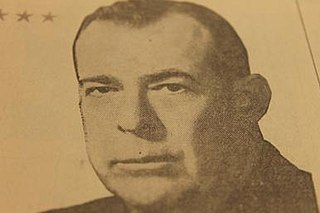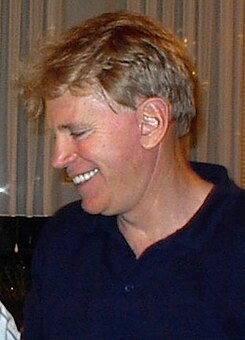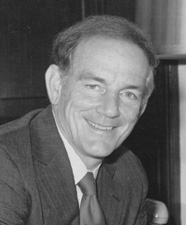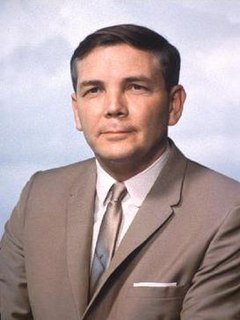
Walter Fox McKeithen served five terms as Secretary of State of Louisiana between 1988 and 2005. He is best known for merging the state's election divisions into one department and for the promotion of historical preservation.
Paul Jude Hardy is an American attorney from Baton Rouge, in the U.S. state of Louisiana, who was the first Republican to have been elected lieutenant governor of the U.S. state of Louisiana since Reconstruction. He served in the second-ranking post under Governor Buddy Roemer from 1988 to 1992.

Louisiana Public Service Commission (PSC) is an independent regulatory agency which manages public utilities and motor carriers in Louisiana. The commission has five elected members chosen in single-member districts for staggered six-year terms. Thus the commissioners have large constituencies, long terms, and close involvement with issues of intense consumer interest ; consequently membership on PSC has been known to serve as a springboard to even higher public office, as in the cases of Huey Long, Jimmie Davis, John McKeithen, and Kathleen Babineaux Blanco —PSC members who became governors of Louisiana.

Charlton Havard Lyons, Sr., also known as Big Papa Lyons, was a Shreveport oilman who in March 1964 waged, as a strong segregationist, the first determined Republican bid for the Louisiana governorship since Reconstruction. Lyons also made a strong but losing bid for Louisiana's 4th congressional district seat in the United States House of Representatives in a special election held in December 1961. At the time of his death, Lyons was considered "Louisiana's Mr. Republican".

Speedy Oteria Long was a Jena lawyer who was a Democratic U.S. Representative from Central Louisiana from 1965 to 1973. Prior to his tenure in the since disbanded Eighth Congressional District, Speedy Long had been a member of the Louisiana state Senate (1956–1964). After he left Congress, he became the district attorney (1973–1985) for the Jena-based 28th Judicial District. He resumed the practice of law in Jena from 1985 to 2005 but was called back to public service in 1994 when the Louisiana Supreme Court appointed him judge pro tem of the 28th Judicial District Court until a judge could be elected in 1995. He was a member of the popular Long political dynasty, being a member of its conservative wing.

The Louisiana gubernatorial election of 1963–64 was held in three rounds. The two Democratic Party primaries were held on December 7, 1963 and January 11, 1964. The general election was held on March 3, 1964. The 1964 election saw the election of John McKeithen as governor.

George Joseph Despot was a businessman in his native Shreveport and a pioneer in the establishment of a competitive Republican Party in the U.S. state of Louisiana. He was the state Republican chairman from 1978 to 1985. His leadership began when the state party was so small that there was a standing joke that the Louisiana GOP could operate from a phone booth, few of which still exist, though the Republicans became the majority party in Louisiana by 2012.

The Louisiana gubernatorial election of 1995 was held on November 18, 1995 to elect the Governor of Louisiana.

The Louisiana gubernatorial election of 1987 was held on October 24, 1987, Democrat Buddy Roemer defeated incumbent Democrat governor Edwin Edwards.
The so-called Louisiana primary is the common term for the Louisiana general election for local, state, and congressional offices. On election day, all candidates for the same office appear together on the ballot, often including several candidates from each major party. The candidate who receives a simple majority is elected. If no candidate wins a simple majority in the first round, there is a runoff one month later between the top two candidates to determine the winner. This system is also used for United States Senate special elections in Mississippi and Texas, and all special elections for partisan offices in Georgia.

The Louisiana gubernatorial election of 1983 resulted in the election of Edwin Edwards as Governor of Louisiana, defeating incumbent David Treen.

Bernard John Bagert Jr., known as Ben Bagert, is an American attorney based in New Orleans who formerly served in both houses of the Louisiana State Legislature. Bagert's peers have consistently voted him as a “Top Lawyer” in the New Orleans area in a variety of fields. He enjoys the highest possible rating conferred by Martindale-Hubbell for ethical standards and legal ability.
William Aicklen Nungesser, was a leader of the Republican Party in the formerly traditionally Democratic state of Louisiana during much of the latter 20th century.

Foster Lonnie Campbell Jr., is an American politician and member of the Democratic Party from the U.S. state of Louisiana. Since 2003, he has been a member of the Louisiana Public Service Commission. He served in the Louisiana State Senate from 1976 to 2002.

The Republican Party of Louisiana is the U.S. state of Louisiana's organization of the national Republican Party. The state chairman is Louis Gurvich, a businessman from New Orleans, who was elected on February 24, 2018. Since the late 20th century, white conservatives in the states have mostly shifted to the Republican Party from the Democratic Party. As of 2016, every statewide elected official in Louisiana, with the exception of the governor, is a Republican.

Clarence C. "Taddy" Aycock, a conservative Democrat from Franklin in St. Mary Parish, was the only three-term lieutenant governor in 20th century Louisiana history. He served from 1960 to 1972. Aycock failed in his only bid for governor in the 1971 Democratic primary. Few lieutenant governors in Louisiana have been elected directly to the governorship; former Governor Kathleen Babineaux Blanco of Lafayette, is a prominent exception.

Elizabeth Ann Rickey, known as Beth Rickey, was a Republican political activist from Louisiana who exposed the neo-Nazi connections of former State Representative David Duke, who ran for the U.S. Senate and for governor of Louisiana in 1990 and 1991, respectively, under the GOP label though opposed by the party leadership.

United States gubernatorial elections were held in three states in 2015 as part of the 2015 United States elections. In Kentucky and Mississippi the elections were held on Tuesday, November 3, and in Louisiana, as no candidate received a majority of votes at the primary election on Saturday, October 24, 2015, a runoff election was held on Saturday, November 21. The last regular gubernatorial elections for all three states were in 2011. Democrats won the open seat of term-limited Republican Bobby Jindal in Louisiana, while Republicans reelected incumbent Phil Bryant in Mississippi and picked up the seat of term-limited Democrat Steve Beshear in Kentucky.
























